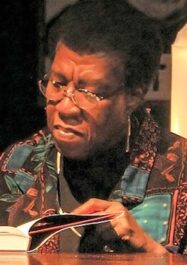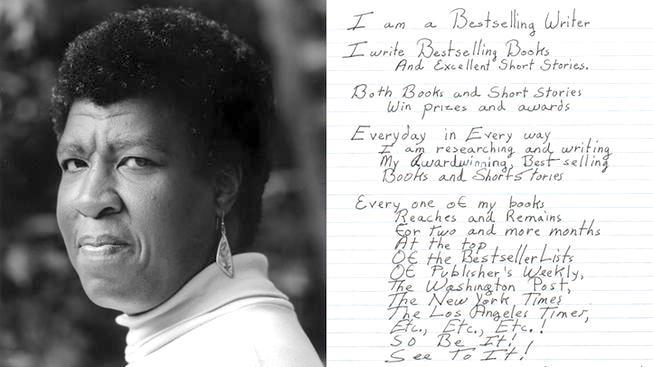Octavia Butler’s Rules for Writers: Wisdom for Every Stage of Practice
By Taylor Jasmine | On November 4, 2019 | Updated September 19, 2023 | Comments (2)

Octavia E. Butler (1947 – 2006), the esteemed American author of science fiction, blazed a trail in what was once a white male-dominated genre. Here we’ll explore Octavia Butler’s rules for writers, with wisdom for every wordsmith no matter where you are on the journey.
Butler was one of the first women and one of the first African Americans to succeed in the genre of sci-fi. To break through in this realm, she had to blaze her own trail, and became rigorously self-disciplined in her writing practice.
She stuck to a strict schedule, sometimes rising at 2:00 am to write for several hours before heading out to whatever odd job she held before becoming a full-time author.
A true introvert, whatever external encouragement she may have lacked, Butler gave to herself. In her notebook, she wrote: “I shall be a bestselling writer. I will find the way to do this. So be it! See to it!”
. . . . . . . . . .

. . . . . . . . .
Kindred (1979) was the book that cemented her literary reputation. It tells the story of Dana, a contemporary Black woman who travels back in time to save an ancestor who happens to be a white slave owner. By saving him in his time, she ensures her own survival in the future.
Other highly-regarded books by Butler include the Xenogenesis trilogy — Dawn (1987), Adulthood Rites,(1988), and Imago (1989). The two-part Parable series — Parable of the Sower (1993) and Parable of the Talents (1998) are also among her best-known works. She is credited as one of those who inspired the Afro-futurism movement.
For Octavia Butler, science fiction wasn’t merely a vehicle for escaping into fantasy, but a means of exploring universal issues that face humanity. Her deep and abiding interest in and observation of human nature within dystopian or fantastical realms is what makes her work so compelling. She’s a natural storyteller as well, as evidenced by her tightly plotted, page-turning novels.
Butler’s New York Times obituary described her as “an internationally acclaimed science fiction writer whose evocative, often troubling novels explore far-reaching issues of race, sex, power, and ultimately, what it meant to be human.”
. . . . . . . . . .

Octavia Butler Quotes on Writing and Human Nature
. . . . . . . . . .
And now, let’s get to Octavia E. Butler’s rules for writers, 9 of them in all — adapted and condensed from “Furor Scribendi,” an essay that appeared in Bloodchild and Other Stories. Here they are, in her own words:
Writing for publication may be both the easiest and the hardest thing you’ll ever do. Learning the rules — if they can be called rules — is the easy part. Following them, turning them into regular habits, is an ongoing struggle. Here are the rules:
Read. Read about the art, the craft, and the business of writing. Read the kind of work you’d like to write. Read good literature and bad, fiction and fact. Read every day and learn from what you read. If you commute to work or if you spend part of your day doing relatively mindless work, listen to books on tape [what we now call audiobooks].
Take classes and go to writers’ workshops. Writing is communication. You need other people to let you know whether you’re communicating what you think you are and whether you’re doing it in ways that are not only accessible and entertaining, but as good you can make them … strangers are more likely to tell you the truth about your work than are your friends and family who may not want to hurt or offended you.
Write. Write every day. Write whether you feel like writing or not. Choose a time of day. Perhaps you can get up an hour earlier, stay up an hour later, give up an hour of recreation, or even give up your lunch hour. If you can’t think of anything in your chosen genre, keep a journal … Journal writing helps you to be more observant of your world, and the journal is a good place to store story ideas for later projects.
Revise your writing until it’s as good as you can make it. All the reading, writing, and classes should help you do this. Check your writing, your research (never neglect your research), and the physical appearance of your manuscript. Let nothing substandard slip through.
. . . . . . . . . .

Photo by Anna Fiore
. . . . . . . . . .
Submit your work for publication. First research the markets that interest you. Seek out and study the books or magazines of publishers to whom you want to sell. Then submit your work. If the idea of doing this scares you, fine. Go ahead and be afraid. But send your work out anyway. If it’s rejected, send it out again, and again. Rejections are painful, but inevitable. They’re every writer’s rite of passage.
Forget inspiration. Habit is more dependable. Habit will sustain you whether you’re inspired or not. Habit will help you finish and polish your stories. Inspiration won’t. Habit is persistence and practice.
Forget talent. If you have it, fine. Use it. If you don’t have it, it doesn’t matter. As habit is more dependable than inspiration, continued learning is more dependable than talent … Persistence is essential to any writer — the persistence to finish your work, to keep writing in spite of rejection, to keep reading, studying, submitting work for sale.
Finally, don’t worry about imagination. You have all the imagination you need, and all the reading, journaling, writing, and learning you will be doing will stimulate it. Play with your ideas. Have fun with them. Don’t worry about being silly or outrageous or wrong.
Persist.
Very interesting article, but why so many typos? Was it created with some kind of voice recognition? I hope someone will fix these.
Oh, yikes. Thanks, Lynne. This really was a blooper and evidently was posted before passing thru final edits. Though this was submitted by a contributor, the buck stops here and I hope I found all the errors. Octavia Butler deserves to be represented properly!